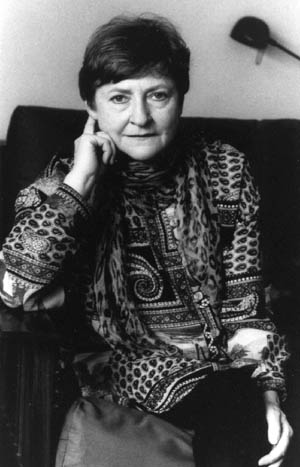It would be pleasant to introduce this year’s Lawrence A. Sanders writer-in-residence, Rosmarie Waldrop, merely by her honors – that she is a Chevalier des Arts et des Lettres, a member of the American Academy of Arts and Sciences, the recipient of awards and grants from the NEA, the Fund for Poetry, the Howard Foundation, and the DAAD Berlin artists’ program. It would be pleasant to introduce her under a single literary function: as a poet, or as a translator, or as an editor. That one must introduce her as all three, however, is a trifle overwhelming. Burning Deck books, the press she edits with her husband Keith Waldrop, has for over four decades been one of the most consistently rewarding sources of new poetry on the American “small press” scene, publishing books & chapbooks by some three or four generations of innovative poets & writers – American, British, French, & German. As a translator, Waldrop has established herself as a central mediator of contemporary European poetry for an Anglophone audience: she has translated Jacques Roubaud, Emmanuel Hocquard, Anne Marie Albiach, Paul Celan, and others, but will no doubt be irreversibly identified with the French Jewish master Edmond Jabès; the 17 books of Jabès’s work she has translated have had a profound effect on American innovative writing of the past two decades. Most of the major modernist writers were translators – Proust translating Ruskin, Eliot translating St.-John Perse, Benjamin translating Proust, Beckett translating Apollinaire, Rimbaud, Mexican poetry, & himself, Pound translating, well, everything – and Waldrop’s work as a translator is far more than a mediating or ancillary activity, but has profoundly informed her own 18 volumes of poetry, from her first collection in 1972, The Aggressive Ways of the Casual Stranger, to the trilogy of prose poem sequences collected in last year’s Curves to the Apple. Her writing, that is, constantly moves in the space of “between”: between languages, between verse and prose, between poetry and fiction; it is constantly at play on what she has called the “lawn of [the] excluded middle.” I would perhaps overstep the bounds of propriety to mention that in her recent nonfiction volumes – Lavish Absence: Recalling and Rereading Edmond Jabès and Dissonance (if you are interested) – Waldrop proves herself a sensitive and sophisticated theorist of poetry and poetics: but this I think she will prove herself in the next hour. Let’s please welcome Rosmarie Waldrop.

1 comment:
I have made the requisite offer of bribes to my classes, and shall be there tomorrow night. I hope they will behave.
Post a Comment